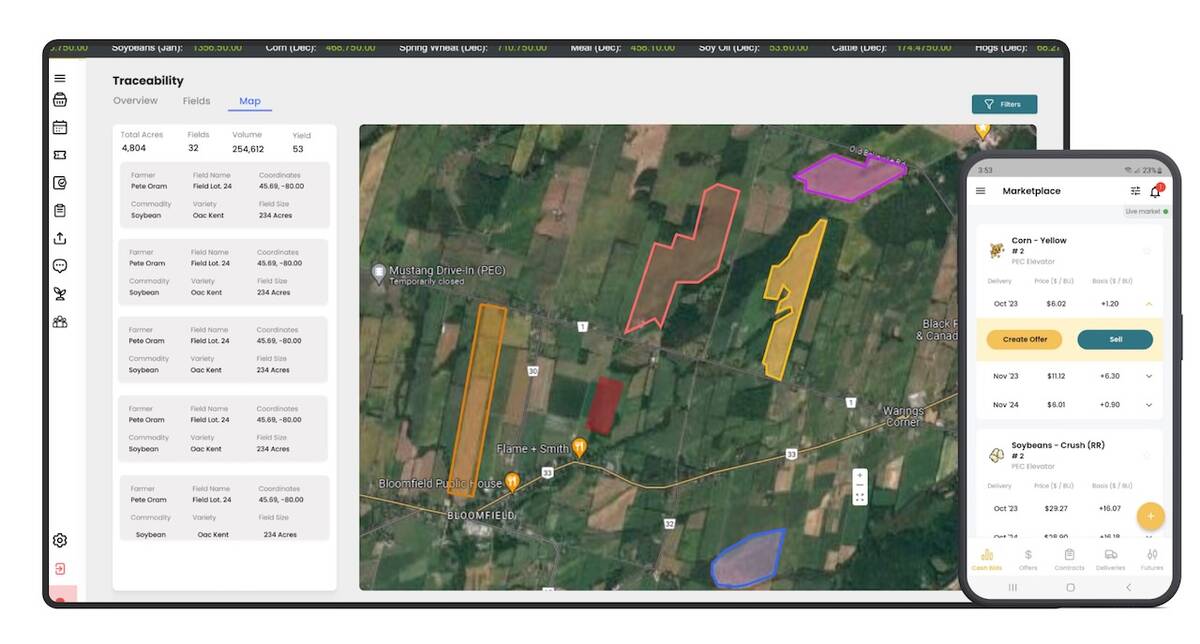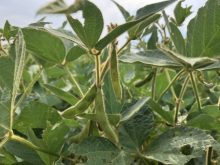Every year, soybean samples from across Canada’s soybean growing regions are evaluated for quality and key characteristics that serve to inform and support every step of the soy value chain.
Growers, seed companies, exporters and international buyers utilize the valuable information to decide what soybeans to grow, commercialize, market to buyers and purchase to process into soy foods.
Why it matters: New tools available from Soy Canada and the Ontario Soybean and Canola Committee make choosing a soybean variety easier for growers.
Read Also

Ontario company Grain Discovery acquired by DTN
Grain Discovery, an Ontario comapny that creates software for the grain value chain, has been acquired by DTN.
Ontario soybean performance trial information dates back as far as 1966, and while the testing has expanded over the years, the purpose of the program remains the same – to obtain agronomic, pest, disease, and quality information for use in supporting the registration of new soybean varieties and in preparing a performance report of varieties.
Soybean variety performance trials are run through the Ontario Soybean and Canola Committee, with trials conducted across provincial regional maturity zones. The results report on the agronomic performance of soybean varieties in the trials, including days to maturity, yield index, plant height, lodging score, oil and protein, and disease ratings.
New this year, these valuable reports are now available on a fresh website, GoCrops.ca, that provides a one-stop site for trial information on soybeans, cereals, corn, canola and dry beans.
“Ontario farmers rely on third-party information to guide and inform their seed selection decisions,” says Laura Ferrier, agronomist with Grain Farmers of Ontario. “Consolidating all the crop information into one site ensures ease of accessibility and long-term viability of trial data for Ontario farmers.”
Focus on food grade
For more than forty years, Canada has been recognized as a global leader in food-grade soybeans, and in 2005 the Canadian Food-Grade Database was initiated to address requests for quantitative and objective information about Canadian soybeans grown for soy food applications. The information for the database was gathered through the testing and analysis of food-grade soybean varieties submitted into the Ontario soybean variety trials.
In 2021, acknowledging the growth of food-grade soybean production in other provinces and the importance of this information for international customers, the Food-Grade Variety Finder was developed by Soy Canada.
Today, Soy Canada coordinates the collection, testing, publication and communication of the data while the Canadian Grain Commission conducts the sample testing. The quality results of the food-grade soybean varieties tested are available in the Food-Grade Variety Finder, a comprehensive, searchable database on Soy Canada’s website, SoyCanada.ca.
Expanding on the agronomic performance analysis of the Ontario variety trial testing, the Food-Grade Variety Finder evaluates several quality parameters including protein, oil, sucrose, oligosaccharides, free sugars, total carbohydrates and total isoflavones. This database, which now features more than 110 varieties, is now the leading resource for quality information on Canadian food-grade soybeans and is tailored for soy foods such as tofu, soy milk, miso, natto and more.
“Showcasing this data not only highlights the superior quality of Canadian soybeans, but also bolsters Canada’s reputation as a trusted supplier of high-quality, sustainable soybeans,” says Nicole Mackellar, Soy Canada manager of market development, who explains that the Food-Grade Variety Finder plays a crucial role in encouraging international customers to adopt new soybean varieties that offer increased value and profitability for Canadian growers.
“The detailed information presented about each variety helps overcome the traditional reluctance buyers have to switching to new varieties, making customers more receptive to change.”
Providing this robust database that helps buyers understand the benefits of switching to new varieties and builds confidence in the quality of Canadian soybeans also enables Canadian soybean growers to access and benefit from the latest technologies and innovations in soybean variety development.
Data promotes Canadian soybeans
“While the Food-Grade Variety Finder is not specifically targeted for growers, the information is still available and can provide them with the opportunity to assess how different varieties perform in terms of quality,” says Mackellar, noting this can be especially helpful for growers interested in growing food grade soybean varieties.
Seed companies also utilize the food-grade variety trial testing service, often submitting samples to assess how varieties perform. This information can inform variety commercialization and end-use markets. Mackellar explains that this testing is crucial for marketing the varieties internationally, and if desired quality parameters do not meet the expectation of global customers, exporters may struggle to sell these varieties, ultimately limiting their availability to growers due to lack of demand.
The information provided by the Food-Grade Variety Finder also enables exporters to highlight the quality of Canadian soybean varieties to their buyer audiences, allowing them to effectively communicate how varieties perform in soy food manufacturing. Mackellar also points out that exporters can use the data to introduce new Canadian-grown soybean varieties to international customers, facilitating a smoother transition to new options.
Most importantly, the Food-Grade Variety Finder is designed to help international customers gain deeper insights into the quality of Canadian food-grade soybeans. Using advanced search functions on the Soy Canada site, international buyers can explore varieties based on desired key quality attributes and find varieties tailored to their specific end-use needs. The comparison feature also allows customers to review quality data for multiple varieties simultaneously, helping them identify the best options for their end use needs.
Soy Canada also takes the lead in promoting the online database to international customers through market development activities, including virtual seminars and trade missions abroad.
“The evolution of testing Canadian-grown food-grade soybean varieties continues as our industry finds new ways to utilize the information,” says Mackellar.












